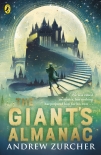The Giant's Almanac by Andrew Zurcher (best summer reads of all time .TXT) 📗

- Author: Andrew Zurcher
Book online «The Giant's Almanac by Andrew Zurcher (best summer reads of all time .TXT) 📗». Author Andrew Zurcher
Fitz’s days at the Heresy thus passed differently. But they changed in another way, too. Where before he and Dina had gone to lessons with the Keeper, the Registrar and the Sweeper each morning, and with the Commissar and the Jack each afternoon, now they were summoned to the Master’s study at the end of each day, for an hour before the evening meal. Each time they climbed to the Master’s study, Fitz felt tense with excitement; surely these lessons would be different from the others, a chance – finally – to work alongside the Master to end the long game they had begun at the Heresy. Surely, as with all their other afternoon lessons, Dina would lose interest, and stop attending; and Fitz craved the opportunity to sit with the Master, alone, and talk through everything that had happened, everything that would happen next. But their afternoon tutorials offered him no such opportunity; Dina walked to the Master’s tower with him, they climbed the stairs together, in the dark study they sat side by side for the whole of the hour, and at the meeting’s close Dina held the door for him while Fitz left the room before her. Through it all, her presence lay on him like an exquisite weight.
But despite Dina’s dampening influence, something strange did begin to happen at their evening lessons, and every step Fitz took, as he left the study by its circular stair, felt to him like a surge of power, as if electricity were coursing through the floors of the Master’s tower, and he had but to place his foot upon the tower step to set his hair on end.
Their first meeting had gone badly. But their second was better. It turned on the experience of eating stack. The Master told them of another part of the same tree – not the root, but the leaf – which, when chewed, caused the person chewing it to slip into a hallucinatory rapture. The white milk in the veins of this leaf had its devotees, he said, who had once gathered the tree’s leaves by the cartload. The priests of this religion believed that the hallucinations they experienced gave them special insight, for in their ecstatic visions they were conscious of themselves as two distinct selves, at once both fully immersed in an experience, and conscious of themselves in that immersion. Dina laughed at this, and said that they were probably poets. ‘Indeed,’ the Master answered her, his dark eyes burning a dark fire in the shadows of the shuttered study, ‘indeed they were.’ This discomfited Dina; her eyes narrowed, and her distraction gave Fitz a moment to enjoy what happened next, without fear of betraying himself.
‘Today,’ said the Master, producing a key from a cord hung round his neck, and using it to open the cupboard behind his desk where the shatranj case was stored, ‘we will begin to study some well-known problems, which the masters of this game call mansūbat. The play of the game will be our only focus now, until you have both become masters.’
The next few days passed without event: in the mornings, Fitz feigned the absorption of the stack, and despite himself, enjoyed it. In the Keep they had moved on from oil painting to sculpture in terra cotta, and Fitz found that he had good hands for this, too. The Keeper showed them a great number of examples, both in the gallery and from books in her library, and instructed them to start with the human shape. ‘This,’ she said, ‘is the most familiar and therefore the most difficult.’ Within days Fitz was making complex figures, and beginning to experiment with distended human forms, accentuating the length of their limbs, or drawing them to an almost wraith-like abstraction. Dina told him that they didn’t look like people at all.
‘They’re the thoughts of people,’ Fitz answered. ‘What people would be, maybe, if they gave up their bodies for ideas.’
Dina scoffed, and left him.
True to his word, in the late afternoons the Master played shatranj with them. He treated Fitz and Dina as beginners, teaching them the names and meanings of the eight pieces in the back row, and then describing in detail how each of the pieces was able to move on the board, and what strengths and weaknesses these limitations conferred on them, both alone and in combination with the other pieces. Dina watched all this with detached interest, perhaps the effect of the loosening grip of stack, late in the afternoon each day, but perhaps too because she still retained some suspicion or reserve about the Master’s tuition. Fitz concealed his knowledge of the game, and his knowledge of the beautiful board that was already, truly, his. As the Master began to work his way through the set problems of the ancient masters, Dina hardly said a word, and it was up to Fitz to respond to every new fact, to every question and invitation that the Master offered. This wasn’t a burden; Fitz found the game engrossing, even when he was merely pretending the instruction was novel, the more so because it connected him to those long spring afternoons the year before, to Mr Ahmadi Senior and his gentle, quiet manner, to his home, to the smell of the wood and earth as he leaped from the roof of the well house and darted through the trees to reach the gate to his back garden.
The Master covered many mansūbat in their afternoon sessions. Always he would begin these sessions by reminding the children that, for a true shatranj master, the game is over before it begins. ‘For





Comments (0)